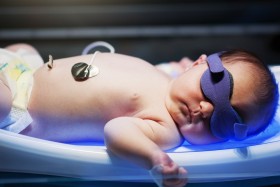Jaundice & Kernicterus Linked to Newborn Brain Damage

Newborns very often have at least one type of medical condition shortly after birth, such as jaundice. Jaundice is one of the most common types of health conditions that occurs in newborns, affecting about 60% of all newborns, according to the March of Dimes.
What is Newborn Jaundice?
Jaundice occurs when an infant has a high level of bilirubin in its bloodstream. If a baby’s liver is mature enough, it will be able to handle removing the bilirubin on its own without any problems. But if the baby’s liver isn’t capable of absorbing bilirubin, it will continue to build up in the bloodstream and cause a yellowish discoloration in the baby’s skin and eyes.
Typically, Jaundice develops within a few days after birth and if it’s caught quickly and treated right away, the baby’s bilirubin levels should drop back down without causing any long-term problems. In most cases, phototherapy (light therapy) is all that’s needed to treat a mild case of jaundice, but a blood transfusion may be needed for a more severe case.
When Jaundice Becomes Kernicterus
While early treatment can prevent long-term complications from jaundice, its effects can be much more serious if treatment is missed. When a newborn’s bilirubin levels continue to rise, the bilirubin can move into the brain and cause a type of brain damage known as “kernicterus.” Kernicterus is rare, but it can result in issues such as cerebral palsy, hearing loss, vision problems, and intellectual disabilities. It’s not known exactly how many people suffer from kernicterus, but early detection and treatment is essential for preventing it.
Preventing Jaundice & Kernicterus
The Centers for Disease Control and Prevention recommends newborns be tested for jaundice every 8-12 hours during the first 48 hours of life and again before the child is 5 days old. If you are discharged from the hospital very quickly after giving birth, meaning within 72 hours, be sure the doctor has given it a jaundice bilirubin test before leaving and make sure you have an appointment to come in for a jaundice test before your child is 5 days old.
Risk Factors for Jaundice & Kernicterus
Although jaundice is extremely common, there are some factors which increase the risk of a child developing jaundice. Babies born prematurely are much more likely to develop jaundice, but it’s also more likely to happen if the child has older siblings who had jaundice, if the child has a different blood type than its mother, or if the child was born with a lot of bruising. Mothers who have type O blood or Rh negative blood are also more likely to give birth to children with higher levels of bilirubin. If your doctor is aware of these factors, it’s particularly important that they be particularly careful to watch for signs of jaundice.
Get Help from a Birth Trauma Lawyer
Brain damage caused by jaundice is extremely preventable. If your child experienced jaundice as a newborn and suffered brain damage as a result, don’t hesitate to contact a birth trauma lawyer right away. At Goodwin & Scieszka, you’ll be able to talk to a lawyer who can answer any questions you might have and help you figure out which legal options are open to you. Contact us today to get started.






